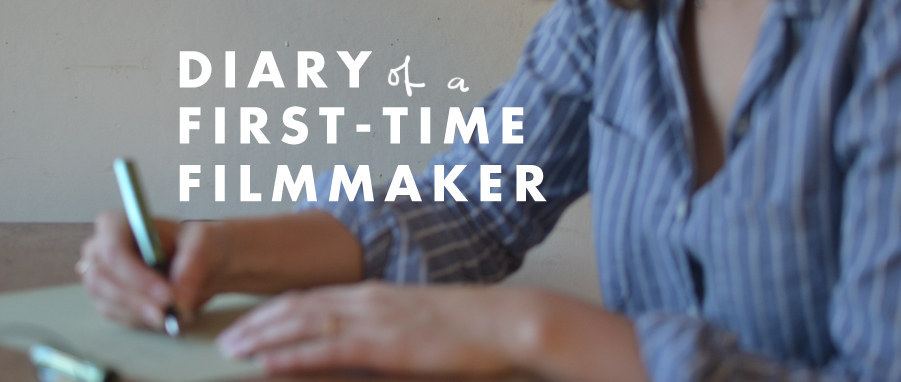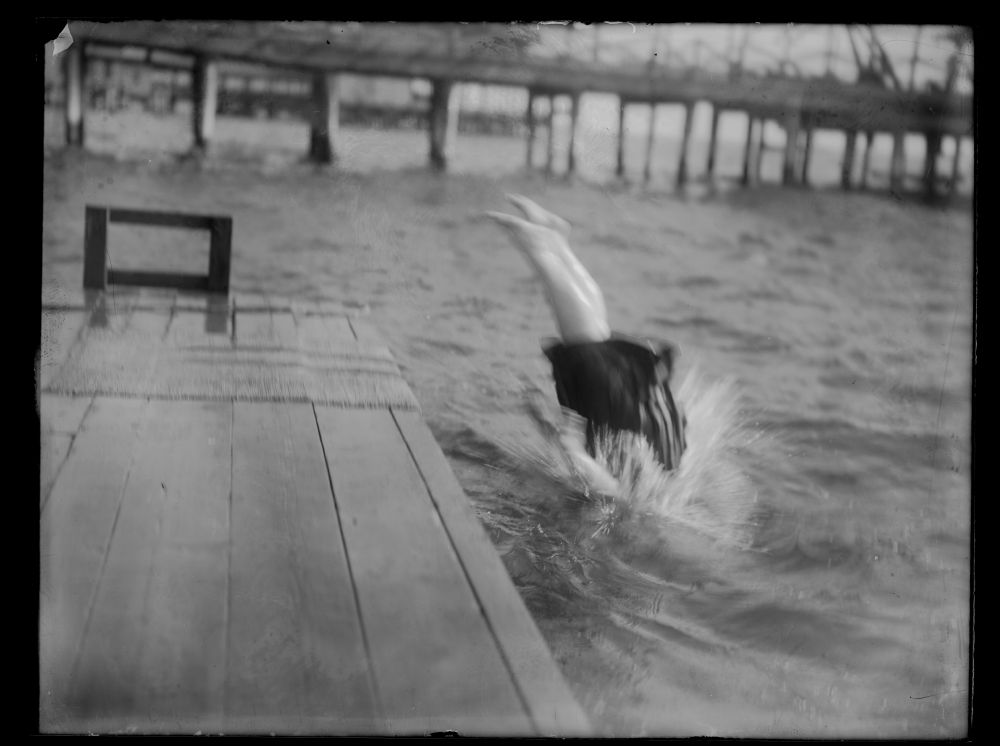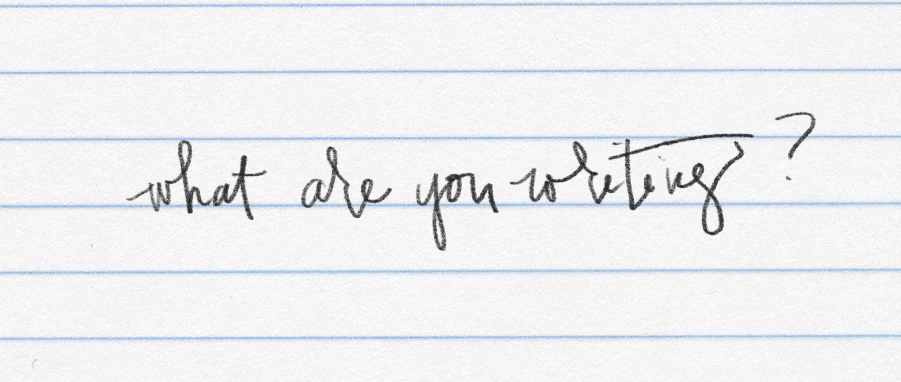Sometimes, on the rarest of rare occasions, a story just happens to you. You don’t expect it; you assume it will contain words similar to stories past. And then it shocks you, but a pleasant jolt akin to a dear, long lost friend tapping you on the shoulder. This is the only way to describe Alexis M. Smith’s delicate tale, Glaciers. I read it in one day, which was a struggle because I wanted it to last longer, but I intend to peruse my own copy from here on out. Ms. Smith is currently working on another book, and she lives in Portland, Oregon with her son.-Samantha Bohnert
It is strange to be a writer in the summertime. I don’t know if this is true for other writers (I have anecdotal evidence that I’m not alone), but I struggle to engage with my writing in the summer months. I might as well be trying to ice skate as I write a novel from June to September. I was born in the Pacific Northwest, so I assume that the heat is what’s doing me in, but it could just as easily be the world outside—berries to pick, mountains to hike, rivers to swim—calling me out of my head, making writing laborious.
Faced with a page of words I can’t seem to make sense of, all I really want to do is go to the beach. Sitting on the sand and listening to the waves should be a good way to reflect on the work at hand, to let my mind comb through snags in the story. But I usually find myself overwhelmed with my own smallness, my own inability to express anything that might come close to the world I envision. What I usually do, after vain attempts at conscious, constructive thought, is hunt for agates.
I have the eye, it turns out. I see agates when others don’t, when others have walked right past them, scanning the ground, turning over larger rocks. I find them when others proclaim that there are none to be found, that they just don’t exist like they used to, since they built the jetty over there, or since this or that beach became popular with tourists.
I found a blue agate half the size of my palm one day in Oceanside, Oregon, while rock hounds all around me found nothing, poking their walking sticks glumly at the pebbles. I didn’t hold it up to the light for everyone to see. I didn’t want to feel their envy. I didn’t want to feel like the lucky one. I dropped it into my pocket so that I could examine it alone, later. I wanted to look at it carefully, to appraise its weight and colors, the way it filtered the late-day light. I wanted to see it fully before I shared it with anyone. What if it was not precious at all? Or what if it was the most beautiful specimen I’d ever find? What if it was both at the same time?
The novel I’m writing has been in my head for almost five years now. It came to me in a dream, soon after my son was born, when the hormones were still strong and my dreams were wild and intricate and bright. I woke up and asked my son’s dad to take him for a while so I could go into another room and write it all down. I knew it was a book. I knew that I would write it. And I knew that it would be important to me, writing this book. But I had another novel to finish in the mean time, and a newborn, and a day job.
Years passed; my son grew; my first novel was greeted with (miraculous!) acclaim and goodwill. And all the while, in a pocket of my mind, this other book grew and grew. I scribbled notes and sources and inspiration in a notebook. Scenes came to me suddenly when I was doing the dishes or folding laundry. Character sketches fleshed out, the plot took on dimension, and symbolism crept in. I felt a charge of energy whenever I talked about it with friends, whenever I thought of what it could be.
Agates form in volcanic rock, where voids in the rock leave room for silica-rich water to seep. Over time, under great heat and pressure, the silica and other minerals crystalize in the spaces. Here in Oregon, we find the remnants of these agates on our beaches, where the Pacific washes them from our basalt coastal cliffs, breaking them apart, scouring them over other rocks with each wave and each tide, polishing them.
Agate hunting was a family past time; I learned young not to ignore what was underfoot at the beach. Over long hours of contemplating the waterline as a child, I developed a fanciful sense that each agate found me as much as I found it. We were destined to meet, there on that shore, at that ebb-tide, as if only I could appreciate the expanse of time it had taken this small wonder to find the light. No matter how many agates I find, that moment of discovery always takes my breath away.
Similarly, when I get the idea for a story, there’s also the uncanny feeling that I have nothing to do with its genesis. The story comes from somewhere outside me, and I am only the space in which it will expand, take on density and weight, color and luminosity; that it was meant for me, and me for it, at the bidding of something greater than both of us. Some days, this comes as a relief: I can give up my self-doubt to a higher power. Other days, the responsibility seems overwhelming: how will I ever be equal to this task?
A few days ago, summer on its last, burnished legs, I got in the car and headed out of town on a whim. I couldn’t face the computer all day in the city heat, construction hammering across the street from my apartment. I sat on the beach, thinking of the story that had been crystalizing in my mind, hoping the ocean would scour away whatever stood between me and the glorious, layered, dynamic thing I wanted it to be.
The water retreated and I waited to see what would be there, on the pebbly stretch of beach. With the sun at that low angle, the small, wet gems gleam more like jellyfish than rock, but I didn’t catch the telltale glint. Finally, when I was ready to give up, I saw one. No one around, I plucked it from the sand and held it up to the light, admiring the glow.
This is the thing I come back to now: the luck of it all. Here I am, sun-drunk, on a deadline, with pages and pages ahead of me, wondering, What if it’s the most beautiful story I’ll ever write? What if, after all this fretting, it’s not precious at all? And what if I’m lucky either way?





















 My family takes a bus from Aix to Cassis, a small beach town not far from Aix. While my parents wander the streets and visit shops, my sister and I lay out our towels on the pebbly beach and soak in the Mediterranean sun with all the other bronzed bathers. I sit up, my arms wrapped around my knees, and stare out over the sea, imagining the Greeks who originally colonized this place looking at the same view thousands of years ago. It probably hasn’t changed very much since then.
My family takes a bus from Aix to Cassis, a small beach town not far from Aix. While my parents wander the streets and visit shops, my sister and I lay out our towels on the pebbly beach and soak in the Mediterranean sun with all the other bronzed bathers. I sit up, my arms wrapped around my knees, and stare out over the sea, imagining the Greeks who originally colonized this place looking at the same view thousands of years ago. It probably hasn’t changed very much since then.